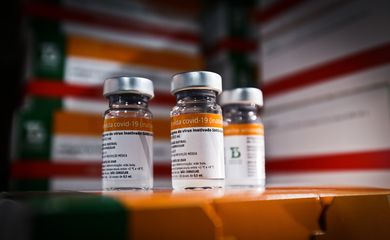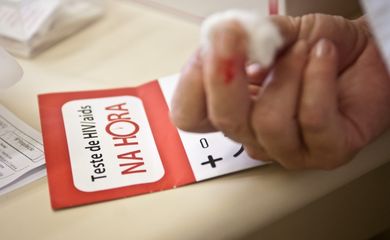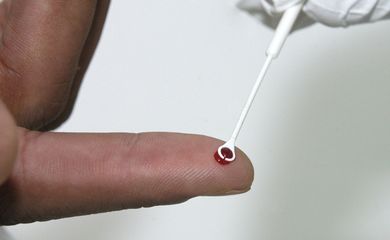NGO in DF sells farofa to help children living with HIV virus

The dream of 20-year-old Mariana* student gained vivid, vibrant colors, something previously unimaginable. She will finish high school now at the end of 2021. When could you imagine that one day she could go back to school? More than that: he gets emotional when he thinks it's possible to raise his three children with quality, thanks to the evolution of science and the support of an entity. She wants, in the near future, a profession of serving, saving, giving a hand... Her dream is to go to college and become a nurse. To be able to help other people, just as it was with her, rescued from a nightmare.

A mother of three and a victim of rape, when she was just 16 years old, she feared about her own future and that of the children when she discovered that she had been infected with the HIV virus, which can cause AIDS. “Practically, I'm one step away from making my dreams come true. What happened to me was a miracle”, the young woman is emotional. Before, a resident of Cidade Ocidental (GO), a municipality located in the vicinity of the Federal District, she was welcomed by Instituto Vida Positiva, in Brasília , an entity that turns 15 this Wednesday, and which was born with the intention of supporting children and teenagers. contaminated by the virus.
The non-governmental organization (NGO), which operates out of a rented house in the Asa Sul neighborhood, was created on December 1, World Day to Fight AIDS. In its support house, the institution takes care of 27 young people, including children and teenagers, and their families. Altogether, it provides assistance to around 300 families, distributing food baskets, clothes, utensils and appliances. It also distributes more than 24,000 snacks a year to patients who are tested for viral load in laboratories at five public hospitals in the Federal District.
the worst disease
The founder and coordinator of Vida Positiva, Vicky Tavares, 72, understands, however, that, in addition to ensuring essential conditions for these people, a fundamental function of the institute is to seek assistance rights, which includes information and the fight against opponent that remains very much alive in 2021, and even more powerful than the virus, prejudice. "This is a much worse disease," he says.
“I even say that, about this situation, very little has changed. There are prejudiced people everywhere. Even with so much evolution in health treatments and science, lack of clarification and insensitivity are realities, even today”, he explains. Gazes, comments and even jokes are part of a violence that is veiled (and not always open), as the activist explains. She looks for every opportunity to explain to neighbors, friends, donors, supporting companies that the successful public policy in the country of drug distribution guarantees a quality life for patients and that, sometimes, the viral load becomes undetectable.
“The public health units here have guaranteed all the necessary medicines to patients who have been diagnosed with HIV. This is a great achievement and one that more people should know about”. Vicky, who is from Pará and was a fashion entrepreneur, created the organization after losing a great friend to AIDS, hairdresser Duda. Before creating her own entity, she worked for an NGO in the administrative region of Taguatinga (DF), specifically dedicated to caring for children with HIV. When this institution would end these activities, it obtained authorization to create Vida Positiva.
"I started to dedicate myself fully to this cause. Showing that we could hug each other, share the dishes, we could kiss each other. Affection and information are fundamental."
She recalls that the love of volunteer work came when she was just a teenager in Belém, and an aunt (Cecília) used to travel with her to peripheral areas to help those who were hungry or without health care.
Pandemic
With the pandemic, the situation worsened for the entity, which lost around 40% in donations. The organization's volunteer, hairdresser Daniela Gomes, 44, who participates in activities as a fundraiser through telemarketing, regrets that, with the crisis, the organization either lost supporters or reduced the amount of resources.
Among recent achievements, Daniela highlights that social isolation did not prevent children from studying. The organization got support from the Chamber of Store Directors (CDL), which provided computers so that children could follow online classes in the last two years of distance.
According to Vicky Tavares, the activities still need volunteers in the area of education who can eventually help answer questions in different subjects.
conversation wheel
Another volunteer, the administrator Carolina Pereira, 43, works at Vida Positiva on a daily basis as a storyteller. “These are children with a lot of need to talk and get attention. We sing, we talk. For me, these 15 years, it has been an inexplicable joy”.
The stories and conversations take on different themes according to the young people's ages. "Adolescents have other questions and it is important that we exchange views." The team also counts on psychological support and social assistance to inform about benefit rights that people with HIV have in the country. "To protect the rights of people with HIV is an action that involves bureaucracy, but it made me learn a lot", guarantees social worker Laís Dantas. Its mission is to make documentation feasible and learn about the realities of each of those served so that the benefits come out of the paper.
Crumbs
In order to meet the entity's financial needs, in addition to donations, the team created an alternative way to obtain resources: the sale of a solidarity “farofa”, which is sold at fairs and on social networks as well. A detail is that the product is not only in the traditional flavor, but also offered in 20 versions, including crackling, apricot and even chocolate (with pepper or without).
The expectation is that, as the end of the year approaches, sales of farofa and also donations will increase. “At Christmas time, people become more sensitive and remember. The challenge is to be aware that we always need support”, says volunteer Daniela Gomes.
The product, in its different flavors, is all made in the NGO's kitchen. “I always enjoyed cooking and wondered what I could make that could be salable. What could I do to help these people? My family always praised the farofa I made at home. I thought it might be feasible. And we started to invent. The job was to secure more ingredients and increase the pots. It's important here to share love between us. This is the recipe for farofa”, emphasizes Vicky Tavares. Flour, butter, onion and good feelings.
The three children of student Mariana* (4, 3 and 2 years old) are also fascinated by farofa, a mandatory ingredient at lunchtime (before or after as well). Nothing is left on the plate. Children prefer chocolate. In the smile, they explain the reason: “it's sweeter”. The mother smiles. She didn't imagine that one day life could be sweet.
The interviewee's name was changed to maintain privacy.
Text translated using artificial intelligence.





